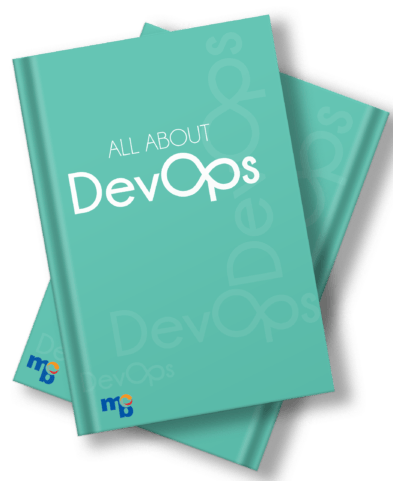As 2024 approaches, the world of technology will experience exciting new developments. To succeed in this fast-paced digital age, embracing the latest practices and technologies is no longer optional – it’s essential for survival. As the heartbeat of innovation, your role as a Chief Technology Officer demands an acute awareness of the pulsating trends that will shape the future of development and operations.
But why should you be reading and following DevOps future trends and statistics? Our DevOps engineer at Mindbowser, Sameed Usmani, explains the reasons:
◊ Increased Efficiency and Productivity: By adopting DevOps trends and incorporating them into your organization’s workflows, you can achieve significant efficiency gains and deliver value to customers more quickly.
◊ Improved Innovation and Agility: By staying informed about the latest trends and technologies, you can equip your teams with the latest tools and knowledge leading to faster innovation and increased agility.
◊ Enhanced Security and Compliance: DevOps trends such as DevSecOps integrate security practices into the entire software development lifecycle, ensuring that security vulnerabilities are identified and addressed early on.
Now, let’s delve into the latest trends you need to know and follow.
With the continuous evolution of technology, the face of DevOps practices constantly changes. Staying informed about the latest trends is crucial for organizations to maintain a competitive edge. Here are the 19 most significant DevOps trends to follow in 2024, along with illustrative images:
DevOps future trends are constantly emerging, with new trends and practices emerging yearly. We will look at some of the predictions for the future of DevOps.
As software enterprises continue to seek ways to develop enterprise solutions independently, adopting microservices infrastructure is becoming one of the new trends in DevOps. Containerization, designed to run processes with minimal deployment, is also rising and is considered one of the future trends of the DevOps deployment model.
Culture is an integral part of DevOps, and it plays a significant role in determining the success of DevOps initiatives. An organization’s culture should encourage breaking free from rigid structures and integrating across every organizational area to achieve optimum business outcomes. Implementing a DevOps culture enables organizations to succeed faster and fosters a consistent learning environment that yields positive results.
Culture is an integral part of DevOps, and it plays a significant role in determining the success of DevOps initiatives. An organization’s culture should encourage breaking free from rigid structures and integrating across every organizational area to achieve optimum business outcomes. Implementing a DevOps culture enables organizations to succeed faster and fosters a consistent learning environment that yields positive results. It is one of the new trends in DevOps culture that is gaining popularity.
The DevOps methodology encourages the notion of shifting left. Traditional activities during the later development and deployment stages are now moving to the left of the pipeline. The main goal is identifying issues earlier and enhancing performance and disaster recovery testing.
Adopting the DevOps framework enables enterprises to enhance quality and cadence and ensure uptime. It has been proven that robust IT organizations that have shifted to DevOps practices can make deployments up to 200 times faster than those that have not moved to this framework. It has also enabled them to enjoy the benefits of more rapid recovery time.
The combination of DevOps and Big Data has taken a step forward toward predictive analysis, making DevOps one of the most reliable tools for automating processes and configuration. Integrating predictive analytics with DevOps helps organizations gain valuable insights and improve performance. As data volumes grow, this collaboration is likely to become even more prevalent.
DevOps is here to stay and will only improve. By adopting new trends and practices, enterprises can enhance their operations and stay ahead of the competition.

The year 2024 promises to be a transformative year for DevOps, with exciting new trends emerging that will revolutionize the way we build, deploy, and manage software. By embracing these trends, organizations can achieve greater speed, agility, and efficiency in their software delivery processes.
To navigate these changes successfully, businesses need a reliable partner who understands DevOps’s intricacies and possesses the expertise to implement these cutting-edge trends seamlessly. This is where Mindbowser, a leading DevOps consulting services provider, comes into play. We stand at the forefront of the DevOps revolution with a proven track record of empowering organizations with innovative solutions and services.
Mindbowser stays at the forefront of DevOps trends through continuous research and training. Our experts will work closely with your team to tailor solutions that align with the latest industry advancements, ensuring a seamless integration of emerging trends into your organization’s DevOps practices.
Mindbowser’s team is committed to ongoing learning and regularly participates in industry conferences and training programs. We leverage this knowledge to guide your organization in adopting latest technologies, such as AI and machine learning, to enhance your DevOps processes and drive innovation.
Security and compliance are paramount at Mindbowser. We implement robust security measures and stay abreast of regulatory changes. Our DevOps solutions are designed to meet the highest standards, ensuring the confidentiality, integrity, and availability of your data while adhering to evolving compliance requirements.
Certainly! Mindbowser has a proven track record of successful DevOps transformations. Our case studies such as Wundercare and Turtle Health highlight instances where organizations experienced significant improvements in efficiency, collaboration, and overall business outcomes by implementing our tailored DevOps solutions.
Mindbowser follows a collaborative approach, understanding the specific needs and challenges of your organization. We customize our DevOps solutions to align with your unique requirements, ensuring seamless integration into your existing workflows. Our team will work closely with yours to minimize disruptions and maximize the benefits of DevOps in your organization.

Increase profitability, elevate work culture and exceed productivity goals through DevOps practices.
Download NowJoin us for “Your 24/7 Clinical Knowledge Partner – The AI Companion” Webinar on Thursday, 30th July 2025 at 11:00 AM EDT
Register Now

We worked with Mindbowser on a design sprint, and their team did an awesome job. They really helped us shape the look and feel of our web app and gave us a clean, thoughtful design that our build team could...


The team at Mindbowser was highly professional, patient, and collaborative throughout our engagement. They struck the right balance between offering guidance and taking direction, which made the development process smooth. Although our project wasn’t related to healthcare, we clearly benefited...

Founder, Texas Ranch Security

Mindbowser played a crucial role in helping us bring everything together into a unified, cohesive product. Their commitment to industry-standard coding practices made an enormous difference, allowing developers to seamlessly transition in and out of the project without any confusion....

CEO, MarketsAI

I'm thrilled to be partnering with Mindbowser on our journey with TravelRite. The collaboration has been exceptional, and I’m truly grateful for the dedication and expertise the team has brought to the development process. Their commitment to our mission is...

Founder & CEO, TravelRite

The Mindbowser team's professionalism consistently impressed me. Their commitment to quality shone through in every aspect of the project. They truly went the extra mile, ensuring they understood our needs perfectly and were always willing to invest the time to...

CTO, New Day Therapeutics

I collaborated with Mindbowser for several years on a complex SaaS platform project. They took over a partially completed project and successfully transformed it into a fully functional and robust platform. Throughout the entire process, the quality of their work...

President, E.B. Carlson

Mindbowser and team are professional, talented and very responsive. They got us through a challenging situation with our IOT product successfully. They will be our go to dev team going forward.

Founder, Cascada

Amazing team to work with. Very responsive and very skilled in both front and backend engineering. Looking forward to our next project together.

Co-Founder, Emerge

The team is great to work with. Very professional, on task, and efficient.

Founder, PeriopMD

I can not express enough how pleased we are with the whole team. From the first call and meeting, they took our vision and ran with it. Communication was easy and everyone was flexible to our schedule. I’m excited to...

Founder, Seeke

We had very close go live timeline and Mindbowser team got us live a month before.

CEO, BuyNow WorldWide

Mindbowser brought in a team of skilled developers who were easy to work with and deeply committed to the project. If you're looking for reliable, high-quality development support, I’d absolutely recommend them.

Founder, Teach Reach

Mindbowser built both iOS and Android apps for Mindworks, that have stood the test of time. 5 years later they still function quite beautifully. Their team always met their objectives and I'm very happy with the end result. Thank you!

Founder, Mindworks

Mindbowser has delivered a much better quality product than our previous tech vendors. Our product is stable and passed Well Architected Framework Review from AWS.

CEO, PurpleAnt

I am happy to share that we got USD 10k in cloud credits courtesy of our friends at Mindbowser. Thank you Pravin and Ayush, this means a lot to us.

CTO, Shortlist

Mindbowser is one of the reasons that our app is successful. These guys have been a great team.

Founder & CEO, MangoMirror

Kudos for all your hard work and diligence on the Telehealth platform project. You made it possible.

CEO, ThriveHealth

Mindbowser helped us build an awesome iOS app to bring balance to people’s lives.

CEO, SMILINGMIND

They were a very responsive team! Extremely easy to communicate and work with!

Founder & CEO, TotTech

We’ve had very little-to-no hiccups at all—it’s been a really pleasurable experience.

Co-Founder, TEAM8s

Mindbowser was very helpful with explaining the development process and started quickly on the project.

Executive Director of Product Development, Innovation Lab

The greatest benefit we got from Mindbowser is the expertise. Their team has developed apps in all different industries with all types of social proofs.

Co-Founder, Vesica

Mindbowser is professional, efficient and thorough.

Consultant, XPRIZE

Very committed, they create beautiful apps and are very benevolent. They have brilliant Ideas.

Founder, S.T.A.R.S of Wellness

Mindbowser was great; they listened to us a lot and helped us hone in on the actual idea of the app. They had put together fantastic wireframes for us.

Co-Founder, Flat Earth

Mindbowser was incredibly responsive and understood exactly what I needed. They matched me with the perfect team member who not only grasped my vision but executed it flawlessly. The entire experience felt collaborative, efficient, and truly aligned with my goals.

Founder, Child Life On Call

The team from Mindbowser stayed on task, asked the right questions, and completed the required tasks in a timely fashion! Strong work team!

CEO, SDOH2Health LLC

Mindbowser was easy to work with and hit the ground running, immediately feeling like part of our team.

CEO, Stealth Startup

Mindbowser was an excellent partner in developing my fitness app. They were patient, attentive, & understood my business needs. The end product exceeded my expectations. Thrilled to share it globally.

Owner, Phalanx

Mindbowser's expertise in tech, process & mobile development made them our choice for our app. The team was dedicated to the process & delivered high-quality features on time. They also gave valuable industry advice. Highly recommend them for app development...

Co-Founder, Fox&Fork
